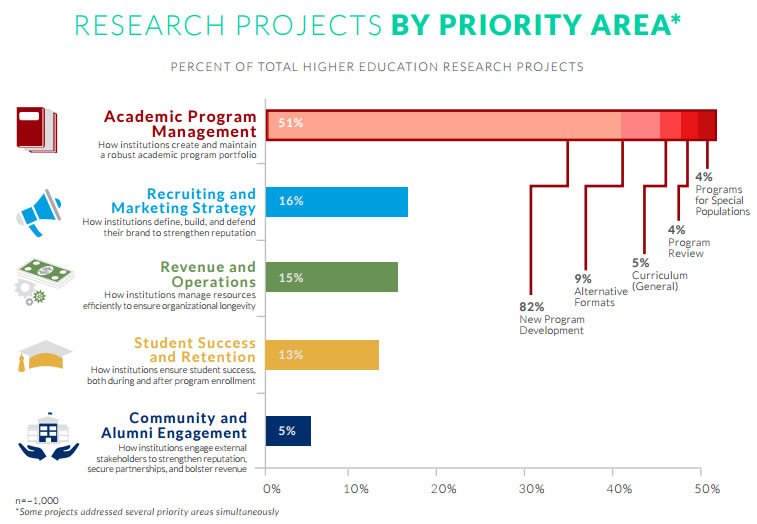Hanover Research pulls together comprehensive trends report based on college and university research projects; forecasts higher ed’s reinvented future.
It doesn’t matter what type of institution you’re a part of or what department you belong to; according to a new industry trends report, every college and university in the country is tailoring its research projects on academic program management—but why, and what does it mean for higher ed’s direction in the future?
“Facing greater market saturation and heightened scrutiny from state and federal governments, higher education institutions now pursue competitive advantages by specializing their program portfolios and thinking more critically about their longevity,” explains the report produced by Hanover Research, part of its Insight Series.
According to Hanover, over 1,000 research reports commissioned by more than 300 higher education clients (Hanover’s client list includes Georgetown University, Gonzaga, Johns Hopkins, Texas A&M, and Wake Forest to name a few) have dealt with program management; specifically, new program development.
The report highlights that 82 percent of all research projects for academic program management focus on new program development. Other research projects most requested by institutions concern recruiting and marketing strategies, revenue and operations, student success and retention, and community and alumni engagement.
(Next page: 5 revelations gleaned from higher ed’s research projects)
Hanover notes that the research projects requested from their clients suggest the following eight key findings:
1. Academic Program Management dominates higher education research landscape: More than 50 percent of Hanover’s higher education research projects over the last year addressed ‘Academic Program Management’ and the ways in which institutions can create and maintain a robust academic program portfolio.
2. Institutions are most interested in researching New Program Development: Within Academic Program Management, the “New Program Development” subtopic constitutes 82 percent of research projects, revealing an industry-wide push to launch topical and viable degree programs. New Program Development research leads to follow-up inquiries supporting program longevity: The most common follow-up projects for New Program Development research include peer program benchmarking and employer needs assessments.
3. Law schools are bolstering their student recruitment and marketing strategies: The percentage of law school projects focused on ‘Recruitment and Marketing Strategy’ (37 percent) is more than twice that for any other institution type, suggesting that these institutions are particularly sensitive to marketing and recruitment challenges today.
4. Community Colleges continue to tackle student retention issues: Community colleges focused more on ‘Student Success and Retention’ than any other institution type, underscoring student attrition as a continued issue area for these organizations.
5. Different institutional leader types and departments have increasingly aligned priorities: From heads of academic affairs to chief financial officers and marketing directors, research priorities among higher education institutional leaders are highly correlated, with Academic Program Management topping most departments’ lists.
“Certain developments in program specialization, generational shifts, and Big Data analytics exist on the horizon that higher education leaders and institutions should consider to monitor,” notes the report. “These changes will further complicate the industry and require progressively more diverse institutional program portfolios.”
5 Predictions about Higher Ed in the Future
According to Hanover, which identified higher ed’s key priorities by examining past research projects in aggregate, the research projects can also help predict these five future changes in the higher education industry across key priority areas:
1. Academic Program Management: Graduate schools will break from traditional programming to keep competitive.
2. Recruitment and Marketing Strategy: Marketing departments will further adapt to a Millennial audience.
3. Revenue and Operations: The 2016 election will spark an increased focus on cost-cutting strategies.
4. Student Success and Retention: Student advising will get even more personalized with predictive analytics and holistic services.
5. Community and Alumni Engagement: Tactics will continue to advance to keep Millennial alumni more engaged, and for longer.
For much more information, including research projects by priority area, by institution type, by department, and by methodology; as well as case profiles and delving into the how’s and why’s of future trends predictions, read the full report here.
- 25 education trends for 2018 - January 1, 2018
- IT #1: 6 essential technologies on the higher ed horizon - December 27, 2017
- #3: 3 big ways today’s college students are different from just a decade ago - December 27, 2017


